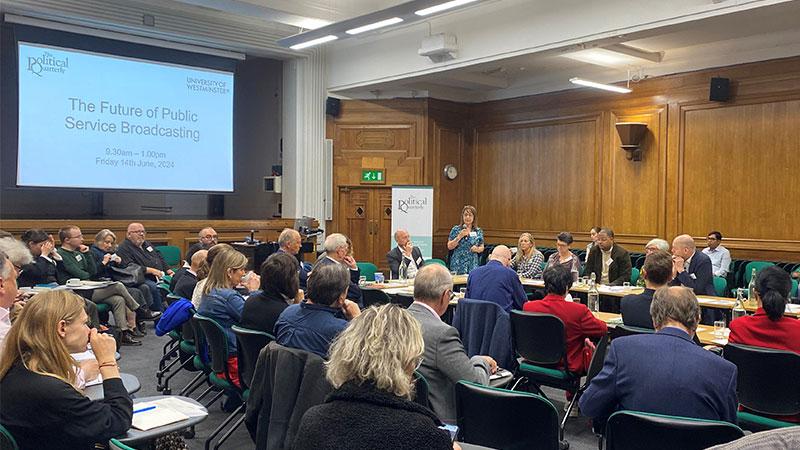Westminster hosts leading figures in journalism to discuss the future of the BBC
 The University of Westminster hosted a workshop on the Future of Public Service Broadcasting which brought together industry professionals, Think-Tank researchers, academics, journalists, civil servants and experts to consider the opportunities and challenges any incoming administration would face in securing the future of information and public service values based in the BBC, and the wider ecology of trusted information.
The University of Westminster hosted a workshop on the Future of Public Service Broadcasting which brought together industry professionals, Think-Tank researchers, academics, journalists, civil servants and experts to consider the opportunities and challenges any incoming administration would face in securing the future of information and public service values based in the BBC, and the wider ecology of trusted information.
The event took place on 14 June in Portland Hall and was hosted by Professor Jean Seaton, Professor of Media History at the University of Westminster, author of a volume of the Official History of the BBC and Director of The Orwell Foundation. She was joined by a variety of industry experts including keynote speaker Sir Mark Thompson, the current Chief Executive Officer of the Cable News Network (CNN) and the former President and Chief Executive Officer of The New York Times Company and Ex-Director General of the BBC.
The workshop was developed out of essays commissioned by Professor Seaton for The Political Quarterly, a journal of distinguished history in combining the most expert political science with clear writing and policy impact. The aim was to raise the strategic, national and international issues about the BBC above the conventional issues of bias. The idea was to face unpleasant facts as a basis for a bolder vision for the information sphere.
Westminster alumna Professor Suzanne Franks, who is Head of the Department of Journalism at City, University London, and a former television producer, journalist and author, welcomed the array of panellists and attendees. This was followed by a discussion between Professor Seaton and Mark Thompson who explored the challenges that the BBC is facing and what action needs to be taken to tackle them. They also spoke around the upcoming general election and how this could affect the future of public service broadcasting.
The room discussed how this was a moment for bravery, risk taking and reconstruction, suggesting that the BBC and the eco-system of public service media needs to be at the forefront of any new industrial research and development strategy for the nation.
Following this were two panel discussions that further explored key strategies for securing the future of the BBC as well as the BBC’s role in the international environment. Among the expert panellists were Dame Diane Coyle, former Economist at the UK Treasury and Economics Editor of The Independent; Stephen Bush, Associate Editor of the Financial Times; Sunder Katwala, founder of British Futures, Sir Lawrie Bristow, the UK’s former Ambassador to Russia, Afghanistan and Azerbaijan; Isabel Hilton OBE, Journalist, Contributing Editor of Prospect and Founder of China Dialogue Trust; and Matthew Postgate, British Digital Technology Strategist and former Chief Technical Officer for the BBC.
After each panel talk there was an opportunity for discussion, with contributions from Su-Mei Thompson CEO of the Media Trust, Ben Fenton from Edelman, Tim Gordon CEO of Best Practice AI, and others who shared insights from their experience and research, working together to bring forward new and innovative ideas.
Professor Seaton said: “It was more powerful as an event than I had expected – with a room packed with expertise – people who have had practical experience of delivering insight and success. It was pure Westminster Media – the best of thinking and action. Not pie in the sky but blue-sky originality.”
This workshop directly contributed to the United Nations Sustainable Development Goal (SDG) 9: Industry, Innovation and Infrastructure. Since 2019, the University of Westminster has used the SDGs holistically to frame strategic decisions to help students and colleagues fulfil their potential and contribute to a more sustainable, equitable and healthier society.
Find out more about studying Media and Communications at the University of Westminster.
Image: University of Westminster






